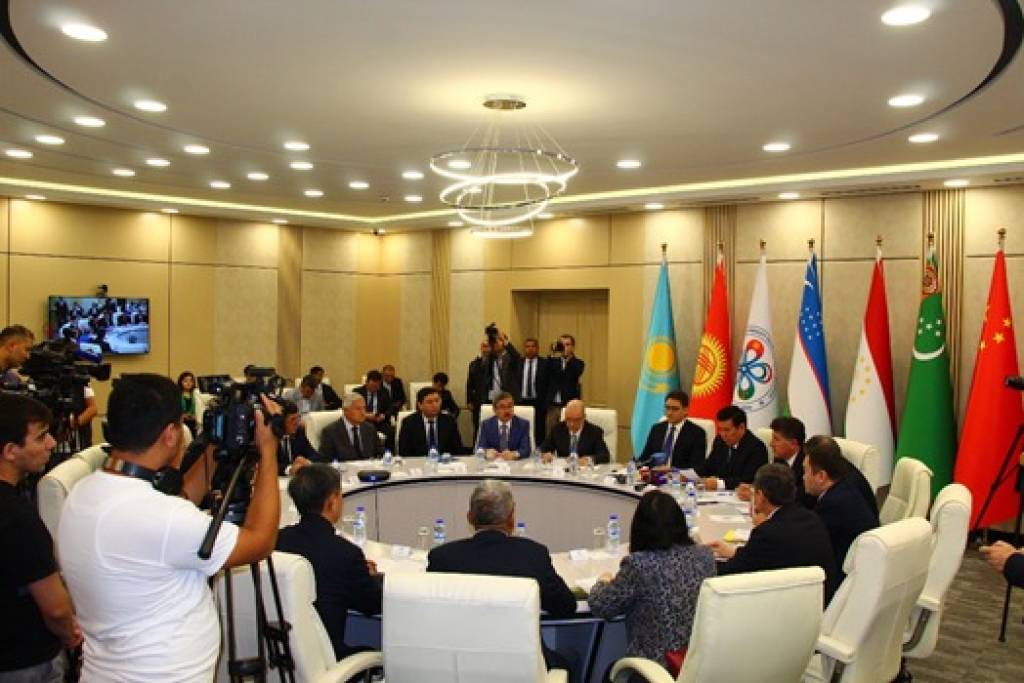
On October 11, a roundtable discussion was held at the International Institute for Central Asia, timed to coincide with the upcoming Third International Forum “Belt and Road”.
Heads of diplomatic missions, leadership, and experts from leading think tanks and research institutes in China and Central Asian countries attended the event.
The state and prospects for cooperation between the Central Asian countries and China in various fields, including politics, economics, trade, investment, energy, combating climate change, water conservation, green technologies, education, and culture, were discussed at the event.
First Deputy Director of the Institute for Strategic and Regional Studies under the President of Uzbekistan Akramjon Nematov delivered a speech on “New opportunities and promising directions for Central Asian countries within the framework of the BRI”.
In his speech, the ISRS representative emphasized that Belt and Road is not just a set of opportunities for economic development. This is a new model of interregional cooperation based on creating connectivity networks for efficient trade flow and further integration of international markets.
According to him, the BRI ensures the sustainability of supply chains and the balanced development of the participating countries’ economies. It is an essential factor in maintaining socio-economic and socio-political stability in the vast space of Eurasia.
The expert continued, noting that thanks to the practical implementation of the Belt and Road Initiative, Central Asia is increasing its geostrategic importance and becoming an essential link in the global value chain.
The project provides unique opportunities for integrating Central Asian states into a single transport and logistics network, providing access for the region’s products to world markets. This is especially important considering the existing geographic isolation of the Central Asian states.
At the same time, additional conditions are being created for the transit of goods, the provision of related logistics services, and industrial cooperation between the region’s countries is being strengthened.
According to Mr. Nematov, many projects in energy, mining, and processing industries and the construction of bridges, highways, ports, and railways have already been implemented in Central Asia.
As a result, mutually beneficial cooperation with China makes an invaluable contribution to the progressive development of Central Asia, promoting economic growth, strengthening connectivity, and, in general, increasing stability and stress resistance.
According to the ISRS representative, based, among other things, on this solid foundation, the Central Asian countries have embarked on the path of a new economic structure, which is based on the use of competitive advantages and complementarity of economies, the formation of an extensive market in the region with its subsequent integration into global value chains.
As visual evidence, the expert cited the results of the Dushanbe Summit held in September this year, where the heads of five states decided to continue joint work to maintain an atmosphere of good neighborliness, trust, and mutually beneficial cooperation in Central Asia and to transform the region into a space of new economic opportunities.
“The event once again confirmed that the process of regional rapprochement has acquired an irreversible and sustainable character”, Mr. Nematov noted.
Along with this, according to him, the consensus on the need for close coordination in industrial cooperation, technological and innovative development, construction of transport and logistics infrastructure, energy cooperation, and above all, a consistent transition to environmentally friendly technologies, adaptation to climate change, expanding access to quality education has become even stronger.
“These are the areas of interaction that are fully consistent with the key priorities of the Belt and Road development”, the expert emphasized.
It was noted that this opens up broad opportunities and prospects for joint efforts with China, which has established itself as a reliable and responsible partner of the region in the international arena. The First Summit of Leaders of China and Central Asian countries, held in May, confirmed this. This significant event made it possible to outline new guidelines and directions for multilateral interaction, including within the framework of the Belt and Road.
At the same time, in the coming years of project implementation, Mr. Nematov called for attention to be paid not only to the creation of “hard” infrastructure, but also to the formation of the so-called “soft” component of the BRI, which includes a social, cultural and humanitarian component.
In this regard, the ISRS First Deputy Director noted the importance of strengthening mutual understanding between representatives of different cultures and civilizations along the Belt and Road. This will ensure long-term support for the fundamental idea of implementing the initiative – the development of inclusive globalization.
In this context, the ISRS representative emphasized the need for establishing business and personal contacts and establishing friendly relations between residents of China and Central Asian states.
On the other hand, Mr. Nematov noted that it is necessary to concentrate on developing human capital. First, this includes enhancing collaboration in education, science, innovation and promoting mutual academic exchanges, primarily among young people.
In this regard, the importance of training a new generation of specialists was noted. It will become the supporting structure of the Belt and Road megaproject and give the initiative additional stability and depth, contributing to effectively implementing its key components.
It was also emphasized that cooperation in environmental protection, the transition to environmentally friendly “green” technologies, and adaptation to climate change, including in water and agriculture, is becoming even more relevant in current conditions.
According to the ISRS representative, by developing close interaction in these areas, countries can balance the BRI agenda between the economic dimension, environmental and cultural-humanitarian aspects, making it possible to effectively use the full range of opportunities inherent in the initiative.
“By firmly following the principles of mutual trust, support, solidarity, respect, and consideration of each other’s interests, we will be able to maintain the dynamic, balanced, and mutually beneficial nature of implementing the Belt and Road Initiative”, Mr. Nematov concluded.
UzA








